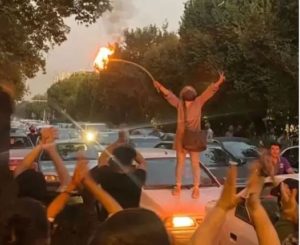The protests in Iran over the last four weeks after the arrest and killing of a 22 year old young Kurdish Iranian woman, Mahsa Amini, by elements of Iranian government, who are called the “morality police”, show no signs of ending. In fact, the small demonstrations that started almost a month ago have now grown and spread to hundreds and thousands of people and to every city in Iran resembling a new Iranian uprising. The protests have also grown in major cities across the world including in London, Paris, Frankfurt and Stockholm, in support of the protests in Iran. The demonstrators in Iran are calling out the Iran’s Islamic Government which has been in power over the last four decades for its atrocities and oppression of the Iranian public and its practices which include imprisonment, torture and rape of the Iranian women and men.
Amnesty International states that women’s rights are human rights. These simply include the right to live free from violence and discrimination; to enjoy the highest attainable standard of physical and mental health; to be educated; to own property; to vote; and to earn an equal wage. However, we know that across the globe many women and girls still face discrimination on the basis of sex and gender. Gender inequality underpins many problems which disproportionately affect women and girls, such as domestic and sexual violence, lower pay, lack of access to education, and inadequate healthcare. For Iranian women these conditions have worsened every year since the Islamic government came to power in Iran. Iranian women who could choose to dress as they wished and attain high educational degrees before the Islamic revolution in 1979 have been forced to take a back sit to their brothers and sons. The morality police can indiscriminately stop women on the street for just wearing a lipstick and punish them as they wish. This happened to Mahsa Amini. Under the Islamic regime standards of living have greatly fallen for the middle class, hard working Iranians and most people cannot afford even food and basics in their everyday lives. Women are disproportionately affected by social and economic pressures.
The women and Men on the streets of Iran are shouting: “Woman, Life, Freedom”, while asking for complete change in the government of Iran and removal of a political regime which has brought nothing except misery and oppression to Iranians over the last forty years with inflations rates of over 50% at times and sanctions due to policies of its government. This has been a government which on one hand kills its own people including tens of children and young people over the last month and on the other sends drones to Russia to kill Ukrainians in the unjust war of aggression of Russia and illegal occupation of Ukraine. Iran’s morality police, Basigis and Pasdaran (two military and security elements of the regime) who are killing the demonstrators on the streets of Iran with live ammunitions are part of the Iranian Islamic government. It is absolutely meaningless for Western governments to sanction these groups while they receive their orders from the leaders of the Islamic government.
Perhaps, it’s time for the international community, and especially, the European Union, the United Kingdom and the United of States of America to start looking at the facts and suffering of Iranian people and start supporting freedom, life and women’s rights in Iran.
Women’s rights are the fundamental human rights that were enshrined by the United Nations for every human being on the planet nearly 70 years ago. Over 2500 years ago, Cyrus the great, the first great king of Persia announced the first declaration of human rights. Cyrus ordered slaves to be freed, declared that all people had the right to choose their own religion, and established racial equality. Cyrus’ decrees were recorded on a baked-clay cylinder in the Akkadian language with cuneiform script, which today is called the Cyrus’ Cylinder. In fact, this ancient record has now been recognized as the world’s first charter of human rights and its provisions are recognized to be similar to the first four Articles of the Universal Declaration of Human Rights. Today, Iranian women are not just asking for their own rights. They are also asking for the rights of every Iranian citizen to live under a government that cares for Iran and Iranian people. Iranian people are asking for freedom and life without the Islamic government.

















